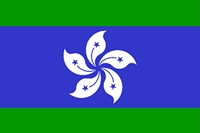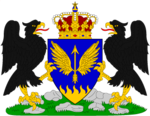Tellia
 | |
| Official language | Gaiano/Tellian (Official), English (Administrative) |
|---|---|
| Capital | Romero |
| Largest cities | Aosta, Sesto Olona, Luino, Ravenna |
| Website | First Tellian Forum |
| Forum | Second Tellian Forum |
| Number of citizens | 6 |
| Number of active citizens | None (Nation Inactive - Annexed to Ashkenatza) |
| Date founded | 17th November 2007 |
| Government | Constitutional Monarchy |
| Current leader | Christopher I Rex |
| Currency | Tellian Real (Telreal) |
| National animal | Eagle |
| National fruit/food | Pizza |
| National drink | Cappuccino |
 | |
| Map versions | 12.6 - 13.7.6 |
Foundation
The origins of the Kingdom of Tellia begin with the demise of the micronation of Gaia, formerly a CIS member state but by late 2007 already dead. On the 17th of November 2007, Hieu Chi Tuong, the last president of Gaia, declared Tellia independent as a seccessor state to Gaia for the 'preservation of Gaian Latin culture'. The seccession of Tellia was not without controversy, as the land it claimed was supposed to be roughly contingent with the old Gaian lands of the CIS on Eura. This was at a time when Babkha was gradually reclaiming land on Eura as the CIS was dying, and Tellian independence was seen by Babkhans as a huge blow to their territorial ambitions for a resurrected Babkha on Micras after the death of the GSO as a mapping organisation.

Hieu, known in Tellia as Dominico Amauri di Rossi, set Tellia on its course to independence, finally reaching a settlement with Babkha which allowed Tellia control of an island archipelago to the north of Eura. Eventually in December 2007 Hieu passed leadership of the nation onto Chris Collins (now known as Chaim Wajnstein), a citizen of Tellia who would be the nation's King until its demise. The precise nature of this transition of power is uncertain, though Hieu's involvement with a large number of other micronations at the time may have been an important factor.
Reign of Christopher I
Christopher I's reign began smoothly with many quick introductions of important legislation and a constitutional convention. Relations with Babkha were also important, this relationship being as close as Shahanshah Rashid Arsalani of Babkha presenting to the King of Tellia the ceremonial command of three Babkhan divisions in November 2007. By January 2008, however, inactivity had taken its toll with Prime Minister Samantha Darling ousted in a vote of no confidence and replaced by Liam Reagan. Reagan's term would be an important one in terms of Tellian politics, as it was during this time that provincial governments in Tellia were established and granted extensive autonomy and the Constitution of Tellia was finally completed.
Nevertheless, the King had been consolidating his own power and declared on January 7th 2008 that the Prime Minister was to be the 'servant of the King', and that the Interior, Military, and Foreign Minister were to be appointed by the King. Tellia, proclaimed Christopher I, was 'not large enough for democracy'. This was not met with resistance and was in fact endorsed by Prime Minister Reagan, who saw the return to a form of monarchial autocracy as in the nation's best interests due to the low activity levels.
However, the Latinate culture of Tellia- inherited from Gaia- was popular with many, and Tellia saw 11 citizenship applications in its first two months of existence as an independent micronation. A new Tellian identity was forged, with an emphasis on the Tellian Church and the sanctity of the Royal household. The State's official motto, Nostrum Placitum Locus ('Our Meeting Place') in Latin, was formalised along with the distinction of maintaining a very active micronational sports society courtesy of Hieu, the Federazione Gaianiano Giuoco Calcio, with its origins in the Gaian Football League.
Tellian culture always remained deeply rooted in its Gaian past, however, with the name of the national language remaining Gaiano. This over time be colloquially referred to simply as 'Tellian'. The national flag also betrayed the Tellian passion for all things of Gaian heritage- identical to the flag of Gaia in every way save for a darker shade of green.
By March 2008, Tellia had moved to a new forum and Reagan's administration had ended, with Will Tomsett becoming the first Grand Councillor, a position created to replace that of Prime Minister but altogether with less power. As Tellia moved to Benacia from Eura and the Grand Council was formalized as the new legislative body, political tensions began to rise as Tellia's isolationism made enemies of Katyusha in July and Hamland in August of 2008. These political disputes with other micronations led to a distinct move to the right in Tellian public opinion, and the recently established political parties represented this shift in opinion. Despite the foundation of the Tellian Liberal Party of Will Tomsett, the Conservative Party of former President Reagan and the King's own 'Liberation Party' (founded to fight Communism) prevailed. The Tellian Communist Party was outlawed following the dispute with Katyusha, one of Micras' first communist nations for many years. At this time Tellia was also negotiating arms sales to Vanderveer for use in a possible war against the Republic of Antica. A bomb attack on the Monarchist National Convention in Romero in September 2008 led to a heightening of the 'red scare' and Tellian isolationism reached new heights, though with this also came significant cultural development.
While various political groups maneuvered for power at home, Tellia had been quietly developing relations with the Vanderveer Reich throughout the early months of 2008. Tellia had several times been denied ambitions claims to more Euran lands - expansions to the North and West had been planned for some time. Vanderveer, however, saw a flourish of activity and made several expansions which met with easy approval. Tellian activity levels struggled in early 2008, even with political scandals rocking the nation regularly. Michael, Prince Regent of Vanderveer, along with Christopher I, King of Tellia, drafted "The Treaty of Vanderveer and Tellia". After referendums passed in both nations, the treaty was signed in early April.
Tellia existed as part of a new nation, entitled Vanderveer-Tellia, from April to June of 2008. The union was shortlived - tempers flared and the fight for power was a constant struggle between Tellians and Vanderveerens. The former King, Christopher, had been granted the position of Home Secretary. By May, however, he had moved for parliament to approve the dissolution of the union. Tensions flared during this period - members of parliament were denounced as "liars" by the former King. Personal disputes between the Prince Regent and Home Secretary made their way into the political battlefield.
A technical issue was debated for several days after the motion for dissolution was made. According to the original treaty, two Tellian regions were granted half a vote each in the Vanderveeren Parliament. The claim was made that the Dukes of these two regions had delegated their voting powers to Christopher. Michael, Prince Regent, made the argument that the Dukes should return and cast their own votes. Eventually, yet another referendum was brought before the people. A virtually unanimous decision was made to end the Union.
It was towards the end of October 2008 when Tellia entered into negotiations with Amokolia and Ashkenatza in the Shirereithan-endorsed Central Benacian Relations Conference, founded to address concerns by the three nations over a large area of unclaimed territory in central Benacia, which Ashkenatza and Amokolia contested. Plans for a merger between the three nations at the conference were immediately rejected, and eventually a settlement was reached which divided the unclaimed lands equally between the three nations, with the city of Benaciastadt being divided into Ashkenatzi, Tellian, and Amokolian Sectors. This agreement culminated in the Treaty of Romero, in which the three signatory nations also vowed never to go to war and to co-operate with each other politically and economically. At this time, Tellia also enjoyed its first experiment with colonialism, claiming a small colony in southern Keltia.
By November 2008 it was felt that isolationism and austerity were at an end, and Christopher I, worried at the lack of activity in the nation, announced a plan to reinvigorate Tellian politics, scheduling elections for a Prime Minister for July 5th 2009. It is believed that this was part of a plan to re-introduce a Constitutional Monarchy to Tellia, but the peace of Romero was not to last long and these hopes were never realized.
Annexation and Legacy
In an move of aggression against Ashkenatza and return to isolationism, King Christopher I ordered all Ashkenatzi citizens to leave Tellian soil by July 3rd 2009, also suspending voting privileges for Tellian citizens of Ashkenatzi descent and forbidding them to leave their province of residence. Ashkenatza, by now far more interventionist due to its 'Yiddishkeyt Doctrine', viewed this as a causus belli and occupied the Tellian sector of Benaciastadt on January 11th. Some Tellian citizens also felt that the King's actions had created an existential threat to Tellia, such as firebrand politician Gjorgio Hjunson, who declared himself Provisional Chairman of the Council to try and restore law and order to Tellia.

A short and bloody war known as the Ashkenatzi-Tellian War of 2009, led to Ashkenatzi forces invading Tellia, occupying the territories now known as South Litovina and Merenia as Tellian forces mobilised in response. By January 14th, Tellia capitulated and signed the Treaty of Klymenburg with Ashkenatza on January 14th 2009, ceding all territory and sovereignty to Ashkenatza, whilst Babkha was granted a port in former southern Tellia in exchange for their military aid to Ashkenatza. King Christopher I remained in his estate in Romero, renamed Romersk, and Tellia was reduced to two Ashkenatzi provinces- Thither and Hither Tellia respectively- whilst many of Tellia's peripheral regions became Ashkenatzi provinces under different names. Christopher I later became an Ashkenatzi citizen, even leading the nation as Nohsi for one term, and always remained committed to Tellian culture in Ashkenatza, where it underwent significant development. A brief attempt at restoring Tellian independence in December 2009 was ignored by Ashkenatzim and Tellians alike, and former Tellian provinces now remain integral to the Republic of Ashkenatza.
Tellians in Ashkenatza now constitute the nation's largest minority, and the 'Tellian Question' features heavily in contemporary Ashkenatzi politics. Attempts to create a Tellian autonomous region have been rejected by the Ashkenatzi Knesset, due to the assimilation of Tellians into Ashkenatza- with one legislator pointing out that there were by 2010 more ethnic Tellians in the Ashkenatzi capital of Kolmenitzkiy than in the former Tellian capital of Romersk (Romero). Tellians in Ashkenatza continue to be one of the most influential ethnic groups in the Republic, with their own divisions in the army and in August 2010 the first ethnically Tellian Nohsi of Ashkenatza, Bartholomeo Henzelli, being sworn in to lead the nation.